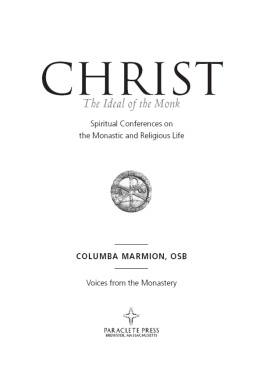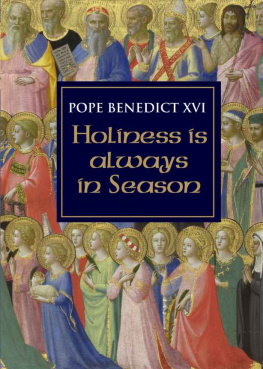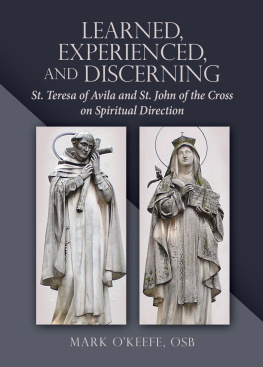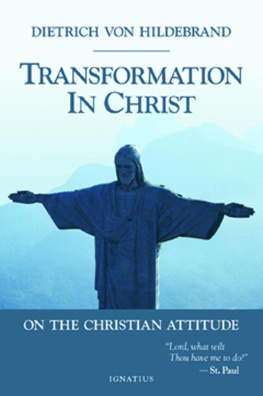
the
VIRTUES
OF HOLINESS
the
VIRTUES
OF HOLINESS
The Basics of Spiritual Struggle

Juan Luis Lorda

The Virtues of Holiness, Copyright 2010 Scepter Publishers for the English edition.
The Virtues of Holiness is a translation of Para ser cristiano 2008 by Ediciones Rialp, S.A., Calle Alcala, 290, 28027 Madrid, SPAIN
Scripture texts from the New and Old Testaments are taken from The Holy Bible Revised Standard Catholic Edition 1965 and 1966 by the Division of Christian Education of the National Council of the Churches of Christ in the United States. All rights reserved. All copyrighted material is used by permission of the copyright owner. No part of it may be reproduced without permission in writing from the copyright owner.
All rights reserved. No part of this book may be reproduced, excerpted or transmitted in any form by any means, electronic, mechanical, photocopying, or sound recording, except with the publishers prior written permission. Inquiries regarding reprints or excerpts should be sent to info@scepterpublishers.org or the address below.
This edition published in June 2010 by
Scepter Publishers, Inc.
P.O. Box 211, New York, N.Y. 10018
www.scepterpublishers.org
English translation by Bernard Browne.
Composition, cover, and text design by Rose Design
Printed in the United States of America
ISBN-13: 978-1-59417-133-8
Contents


The spiritual lifeor asceticism, it is sometimes calledis an experience of the life of faith that the Church has been accumulating and transmitting from the beginning. This book contains what I have received from others, especially the founder of Opus Dei, St. Josemara Escriv. The rest comes from classical authorsFathers of the Church, especially St. Gregory of Nyssa (d. ca. 386), Sts. Augustine and Cassian (d. 430 and 435), St. John Chrysostom (d. 407), and St. Gregory the Great (d. 604)and writers such as St. Thomas Aquinas (d. 1274), St. Teresa of Avila, St. John of Avila, and St. John of the Cross (all sixteenth century), St. Francis de Sales (d. 1622), and many others. Among more recent authors I have made use of the writings of John Henry Newman, G.K. Chesterton, C.S. Lewis, Ronald Knox, Romano Guardini, and Josef Pieper; I also owe something to spiritual writers such as Eugene Boylan, Georges Chevrot, and Reginald Garrigou-Lagrange, among others. I have tried to cite sources in the simplest possible way to avoid overloading the text. Many of the citations from the founder of Opus Dei are simply given as the title of the book followed by the number of the point cited: The Way, The Forge, Furrow, Christ Is Passing By, Friends of God, Conversations, and The Way of the Cross.
This book is divided into two parts. The first deals with the manner of acquiring virtues. The second presents more directly some features of the life of Jesus that a Christian should conscientiously try to imitate.
The book does not propose an ascetical method. It only tries to provide suggestions about the first steps in this path to the summit. One warning is necessary. I have mentioned the great gulf between wanting to do something and doing it. Ascetical theory is useless without ascetical practice. For the reading of this book to make sense, the reader must make resolutions and set objectives that will help him or her to advance, forever reviewing the objectives and renewing the journey.
Someone who lives like this will see that it is not complicated. The Christian life, like all life, has much spontaneity. Animals and plants grow by themselves, and the same happens here. No need to worry about all the details; the important thing is to keep moving ahead. And so the virtues will grow.
Anyone who begins this journey will find it a great experience that lends excitement to living. For God alone can be loved with enduring passion.

Glory to God in the highest, and on earth peace among men with whom he is pleased!
Lk 2:14
St. Mark tells us in his Gospel (12:28) that, on one occasion, a scribe approached our Lord and asked him: What is the greatest commandment? Jesus answered him: The first is Hear, O Israel: The Lord our God, the Lord is one; and you shall love the Lord your God with all your heart, and with all your soul, and with all your mind, and with all your strength.
These words would have been very familiar to Jesus listeners for they were from the Law of Moses (Deut 6:4). The Jews had the custom of reciting them as a prayer at least twice daily. Yet the fact that the scribe asked this questionSt. Matthew tells us it was to test Jesus (Mt 23:35)indicates that the answer could have been different or that others would have responded differently.
Today as then, this commandment is not easy to keep first and foremost in daily life, where it must compete with many interests. We may never have stopped to think of the enormous demands of these words: You shall love the Lord your God with your whole heart, with your whole soul, with your whole mind, and with all your strength. But the principal and most basic demand of the Christian life is to love God with all our strength of soul and body.
This first commandment is inseparably united to a second: You shall love your neighbor as yourself (Mk 12:31; Lk 19:18). Our Lord later confirmed it with even greater force as a new commandment by telling his disciples to love one another as he himself loved them: that is, with the immense love of the heart of Christ who is God.
How can we love God with all our strength and our neighbor as ourselves, and, even more, with Gods love? Are we capable of loving in this way? Is such an absolute love within our power?
The answer, based on the experience of many people who have made the effort throughout the centuries, is that such love is possible. But it is not a moment of ecstasy, nor is it enough simply to decide to do it. Rather, it is a matter of ones whole life. Only by a patient, constant, repeated, and thoughtful effort and with the help of God, can one become capable of loving God above all things and ones neighbor as oneself. It presupposes an extraordinary concentration of effort and involves all dimensions of human nature. Christian tradition calls that state sanctity: He chose us in him before the foundation of the world, that we should be holy and blameless before him (Eph 1:4). And it makes one similar to God himself: He who loves is born of God and knows God. He who does not love does not know God; for God is love (1 Jn 4:78); God is love, and he who abides in love abides in God, and God abides in him (1 Jn 4:16).
The sanctity that God expects of man is, in great part, Gods pure giftgracewhich comes to us through Jesus Christ. In this is love, not that we loved God but that he loved us and sent his Son to be the expiation for our sins (1 Jn 4:10). But it also requires effort on the part of a human being, who tries little by little to overcome his limitations, to increase his capacities, to concentrate his strength, to love more and better each day.
Next page












